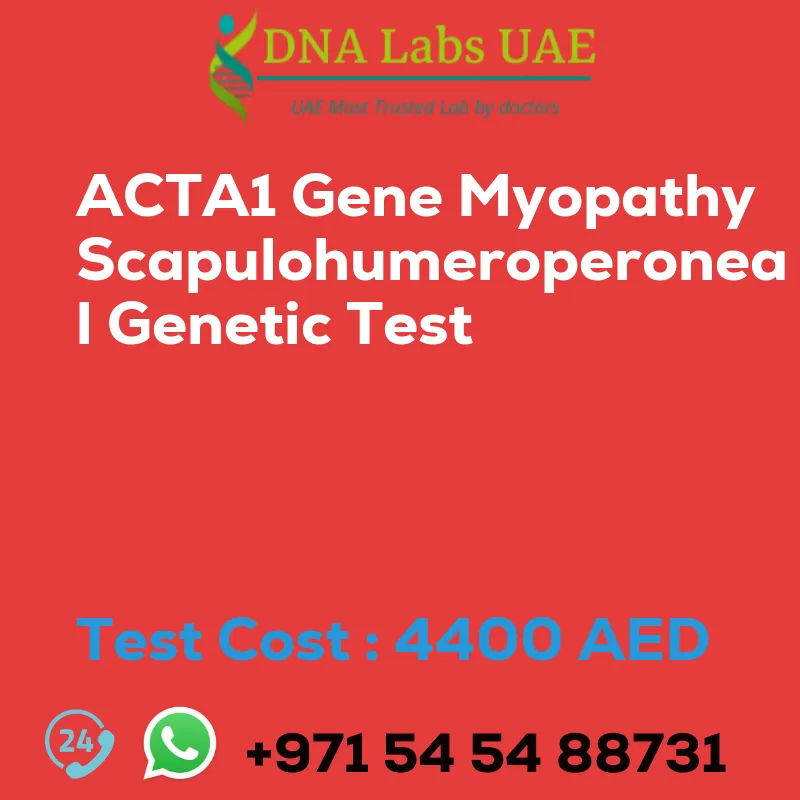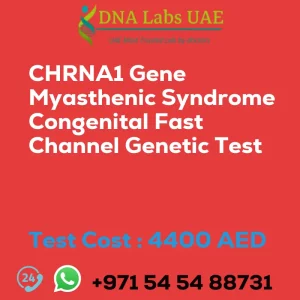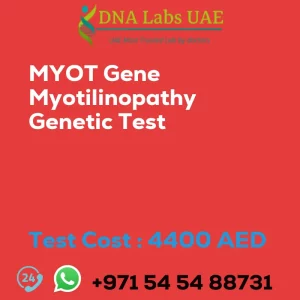ACTA1 Gene Myopathy scapulohumeroperoneal Genetic Test
At DNA Labs UAE, we offer the ACTA1 Gene Myopathy scapulohumeroperoneal Genetic Test. This test is designed to diagnose and provide information about the ACTA1 gene mutation, which is responsible for ACTA1 gene myopathy, also known as scapulohumeroperoneal NGS genetic test.
Test Components and Price
The ACTA1 Gene Myopathy scapulohumeroperoneal Genetic Test is priced at 4400.0 AED. The test requires a blood sample for analysis.
Report Delivery and Method
Once the sample is received, the report will be delivered within 3 to 4 weeks. The test utilizes NGS (Next-Generation Sequencing) technology for accurate and efficient analysis.
Test Type and Doctor
The ACTA1 Gene Myopathy scapulohumeroperoneal Genetic Test falls under the category of Neurological Disorders. It is recommended to consult with a Neurologist for this test.
Test Department and Pre Test Information
The test is conducted in our Genetics department. Prior to the test, it is important to provide the clinical history of the patient who is undergoing the ACTA1 Gene Myopathy scapulohumeroperoneal NGS Genetic DNA Test. Additionally, a Genetic Counselling session will be conducted to draw a pedigree chart of family members affected by ACTA1 Gene Myopathy, scapulohumeroperoneal.
Test Details
ACTA1 gene myopathy, also known as scapulohumeroperoneal NGS genetic test, is a genetic disorder characterized by muscle weakness and wasting. It primarily affects the muscles of the shoulders, upper arms, lower legs, and feet. This condition is caused by mutations in the ACTA1 gene, which is responsible for producing the actin protein – an essential component of muscle fibers.
The scapulohumeroperoneal NGS genetic test utilizes next-generation sequencing (NGS) technology to analyze the ACTA1 gene. NGS allows for the simultaneous analysis of multiple genes, making it an effective tool for diagnosing genetic disorders.
The ACTA1 Gene Myopathy scapulohumeroperoneal Genetic Test helps confirm the diagnosis of ACTA1 gene myopathy by identifying mutations in the ACTA1 gene. It also provides information about the specific mutation(s) present, which can aid in determining the severity of the condition and guiding treatment decisions.
Who Should Get Tested?
Genetic testing for ACTA1 gene myopathy is recommended for individuals experiencing symptoms suggestive of the condition. These symptoms may include muscle weakness and wasting, difficulty walking, and respiratory problems.
The test can also be useful for family members of individuals with a known ACTA1 gene mutation, as it can help determine their risk of developing the condition.
It is important to note that genetic testing for ACTA1 gene myopathy should be conducted by healthcare professionals specializing in genetics, such as genetic counselors or geneticists. These professionals can provide detailed information and guidance regarding the test, its implications, and the potential benefits and limitations of testing.
| Test Name | ACTA1 Gene Myopathy scapulohumeroperoneal Genetic Test |
|---|---|
| Components | |
| Price | 4400.0 AED |
| Sample Condition | Blood |
| Report Delivery | 3 to 4 Weeks |
| Method | NGS Technology |
| Test type | Neurological Disorders |
| Doctor | Neurologist |
| Test Department: | Genetics |
| Pre Test Information | Clinical History of Patient who is going for ACTA1 Gene Myopathy, scapulohumeroperoneal NGS Genetic DNA Test A Genetic Counselling session to draw a pedigree chart of family members affected with ACTA1 Gene Myopathy, scapulohumeroperoneal |
| Test Details |
ACTA1 gene myopathy, also known as scapulohumeroperoneal NGS genetic test, is a genetic disorder characterized by muscle weakness and wasting, particularly in the muscles of the shoulders, upper arms, lower legs, and feet. It is caused by mutations in the ACTA1 gene, which provides instructions for making a protein called actin, an important component of muscle fibers. The scapulohumeroperoneal NGS genetic test is a type of genetic test that uses next-generation sequencing (NGS) technology to analyze the ACTA1 gene. NGS allows for the simultaneous analysis of multiple genes, making it a powerful tool for diagnosing genetic disorders. This genetic test can help confirm a diagnosis of ACTA1 gene myopathy by identifying mutations in the ACTA1 gene. It can also provide information about the specific mutation(s) present, which can be helpful for determining the severity of the condition and guiding treatment decisions. Genetic testing for ACTA1 gene myopathy may be recommended for individuals with symptoms suggestive of the condition, such as muscle weakness and wasting, difficulty walking, and respiratory problems. It can also be useful for family members of individuals with a known ACTA1 gene mutation, as it can help determine their risk of developing the condition. It is important to note that genetic testing for ACTA1 gene myopathy is typically performed by healthcare professionals specializing in genetics, such as genetic counselors or geneticists. They can provide information and guidance regarding the test, its implications, and the potential benefits and limitations of testing. |








